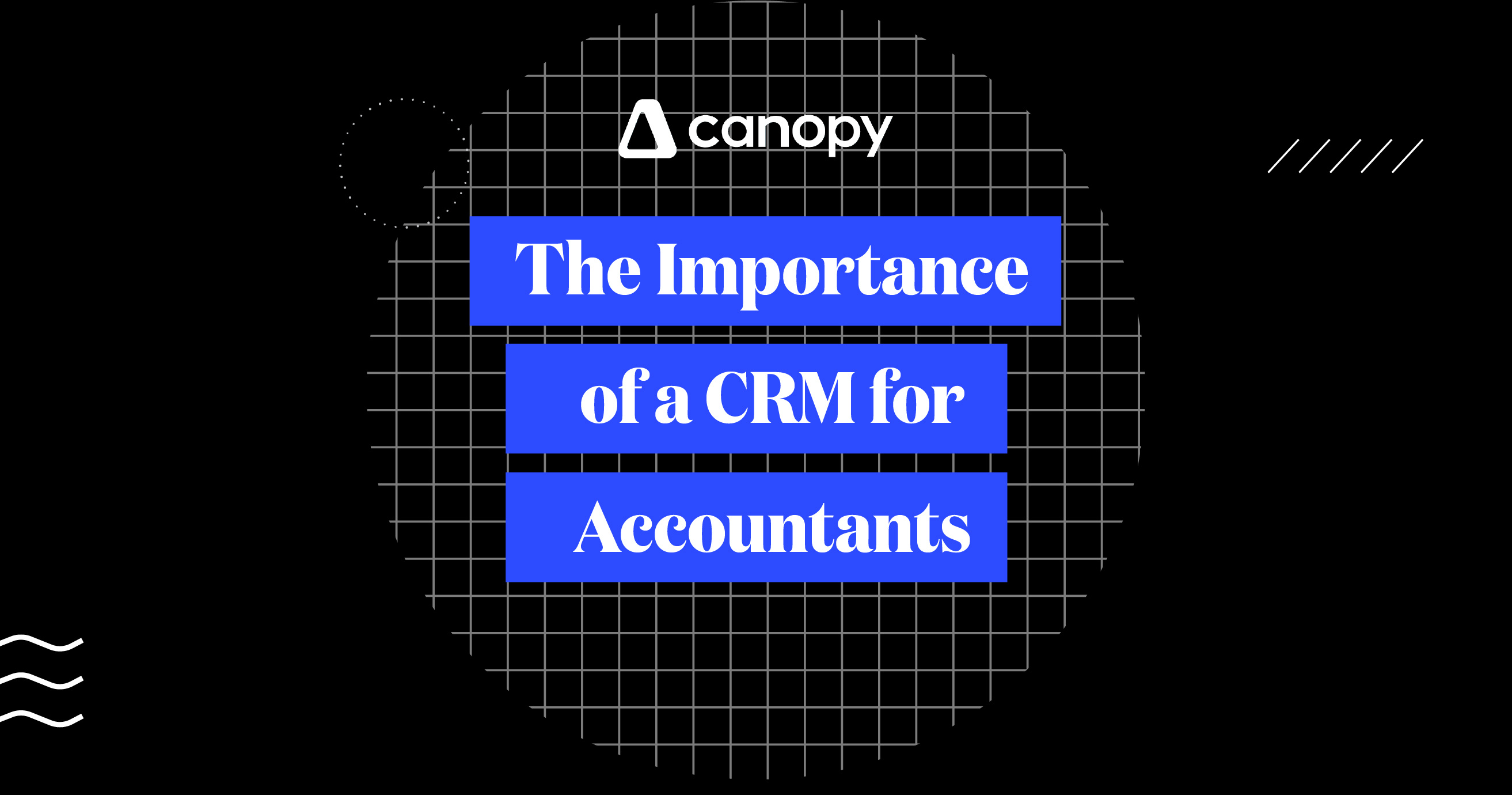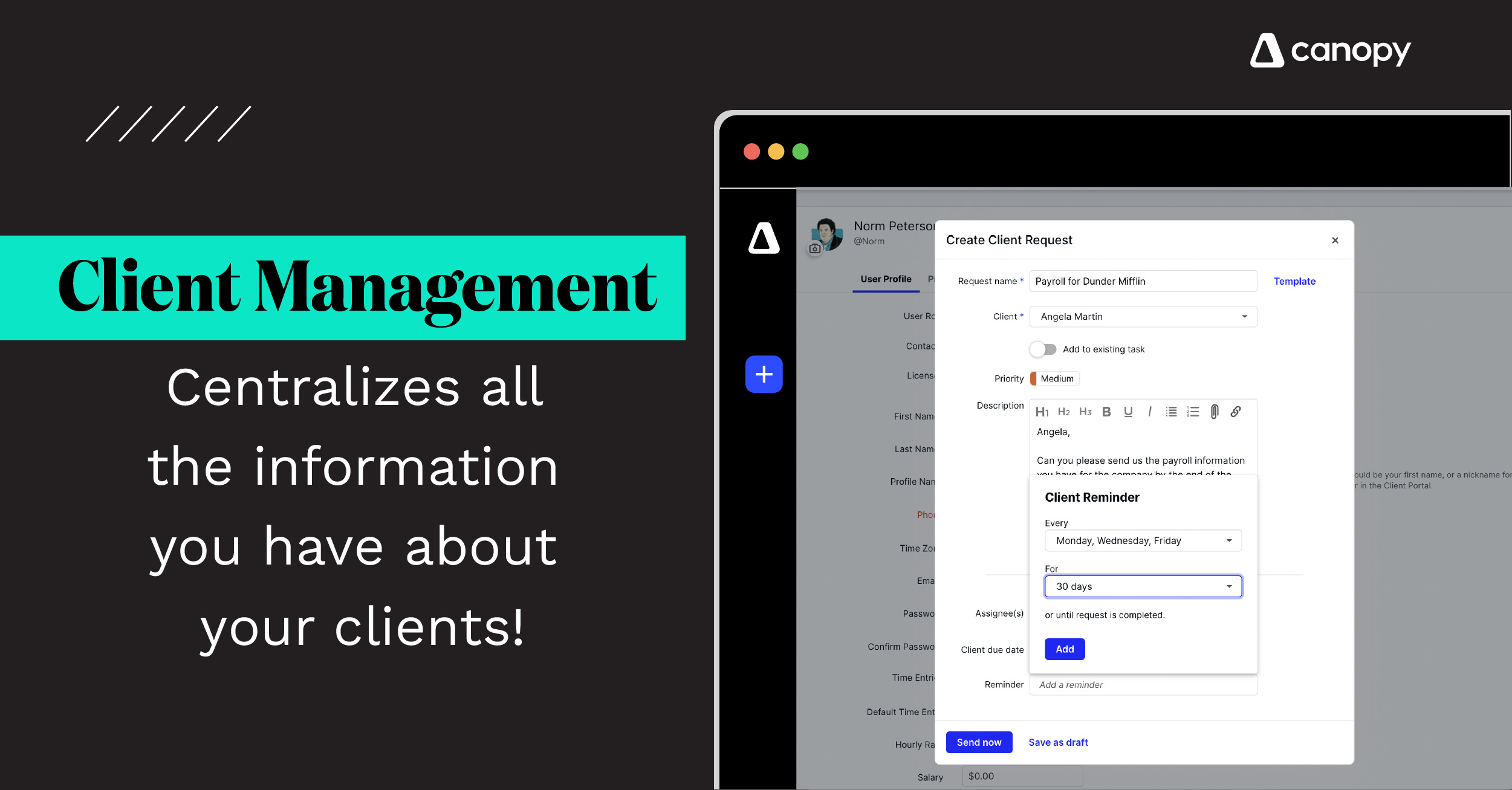Accountants know first-hand that client expectations are increasing and competitive pressures are on the rise. Over 80% of accounting professionals plan to, and many are already, offering advisory services because clients want more from you.
Firms can hire more accountants to deal with these new expectations, but the field is in a talent crunch that no one can deny. Technology is the logical choice for exceeding demands.
Customer Relationship Management (CRM) software is a logical step for accounting firms because they:
- Boosts efficiency
- Improves the client experience
If you’re unfamiliar with CRMs, here’s a brief primer: CRMs allow you to keep your client data in one safe location to improve communication and workflows. For accounting firms, that means you can keep all of the data pertaining to a client in your CRM, such as messages, files, tax documents - anything relating to your client.
Accounting firms that are not using CRMs to manage relationships with prospects and clients are missing out on a proven way to enhance the experience.
Why CRMs are Important for Accounting Firms
CRMs can increase client relationships by 74% and retention by 27%, which can be game-changing for accounting firms. Your CRM should do a few things well:
- Client Relationships: Your CRM should help you manage your interactions with current and prospective clients. Deeper relationships will help firms retain clients and aid in sales growth.
- Prospect Management: A CRM will help you track your leads and prospects throughout your entire marketing campaign. Prospect management maximizes sales and growth while ensuring no leads fall through the cracks.
- Client Management: Integrating the right CRM into your firm allows you to log the clients’ preferences, needs and history. If someone takes over the client or the person who normally helps them is not in the office, the CRM ensures that there are no information gaps. Clients and accountants can continue on with the same conversations without missing a beat thanks to the information in the CRM.
A lot of the benefits of a CRM relate to your client relationships, but they also allow your staff (and you) to free up time to focus on value-added services. When your data is all in one centralized location, it helps streamline much of your time-intensive tasks by making information readily available.
CRMs also allow for an easy way to see which clients are using what services so that you can cross-sell and up-sell services to them in the future.
As the firm grows, scaling to handle greater client loads and operations is possible. Your CRM can also address crucial challenges that you face as an accountant.
Challenges CRMs Address for Accounting Firms
What challenges can a CRM address for firms? Quite a few that every professional in the field has dealt with to some degree:
- Data disorganization, which lowers client satisfaction and can lead to client loss
- Communication inefficiencies, which make it challenging for new professionals to step into their roles
CRMs organize your client data and fit right into your workflows. Your CRM is a central client hub that houses all communication with a client, data, files shared and more. A well-chosen CRM will streamline your processes, increasing efficiency and allowing you to better serve the client.
In other words, your CRM is a win-win for clients and accounting teams.
What Features are Important in a CRM for Accountants?
Just as every accounting firm is unique, every CRM is also unique and will offer different features.
It’s important to look for a solution with features that align with your firm’s goals and needs.
Canopy’s CRM, for example, has features that most firms will appreciate, such as:
- Client dashboards and lists, where you can tag, filter, sort, customize and segment client data.
- The ability to create client groups and record templates to save time.
- Client communication dashboard, where you can view all communications between clients and members of your firm.
- The ability to generate emails with AI to streamline communication and save time.
CRM Features such as these allow your accounting firm to build meaningful relationships, stay on top of communication and ensure that your clients have a consistently positive experience when dealing with your firm.
How to Choose a CRM
Every CRM has its own advantages and disadvantages. The right one for you will depend on your goals and needs. But when choosing a CRM, it’s important to consider more than just the features it offers. You should also consider how the platform supports your firm as a whole.
When weighing your options, here are a few things to consider:
Is the CRM Accounting Industry-Specific?
First, consider whether the CRM was designed specifically for your industry. Although not required, having a CRM that was built with accounting in mind can offer many advantages.
For example, an accounting-specific CRM will integrate important financial tasks like transactions, financial reporting, and invoicing directly into its application. These features streamline financial management and customer relationships from one centralized platform.
A traditional CRM may not offer this same level of functionality, which means you may need to use another tool for these tasks.
Does the CRM Integrate Neatly Into Your Tech Stack?
When choosing a CRM, it’s easy to overlook the importance of integration, but don’t make this mistake. Consider whether the software will integrate with your current tools (like QBO) to streamline your workflow even further and seamlessly pass information from one application to another.
For example, QuickBooks integration would allow you to seamlessly manage your clients and their invoices and service items.
Does the CRM Platform Have the Features Your Firm Needs?
Does the CRM offer you access to other features you need as an accounting firm, like:
These are essential features that benefit virtually every firm, but you may have additional ones you need.
Create a list of your ideal features, and make sure that the CRM you’re considering offers them.
Is the CRM Easy to Implement?
You may find the best CRM in the world, but if it’s difficult to implement and has a steep learning curve, you’ll probably never use it.
When comparing solutions, inquire about the implementation process. How easy or difficult will it be to get things up and running? What will be required from a training perspective for both your firm and your clients?
The easier it is to implement and adopt the CRM, the better.
These are some of the most important considerations when choosing a CRM, but you may have additional concerns that you’ll need to weigh.
Summary
CRMs help accounting firms manage client relationships in a more strategic and streamlined way. Without a reliable CRM, your firm may struggle to stay on top of client communications and needs. Finding the right solution can be challenging, but the guide above will help you find a CRM that aligns with your goals and needs.

Katie Thomas, CPA is a 40 under 40 CPA Practice Advisor recipient, Top 50 Women in Accounting recipient, and the owner of Leaders Online, where they help accounting and B2A (business to accounting) professionals increase their impact, influence, and income through thought leadership and digital marketing. To get in touch with Katie, schedule a time at: https://leaders-online.com/.
READ MORE BY Katie






Get Our Latest Updates and News by Subscribing.
Join our email list for offers, and industry leading articles and content.